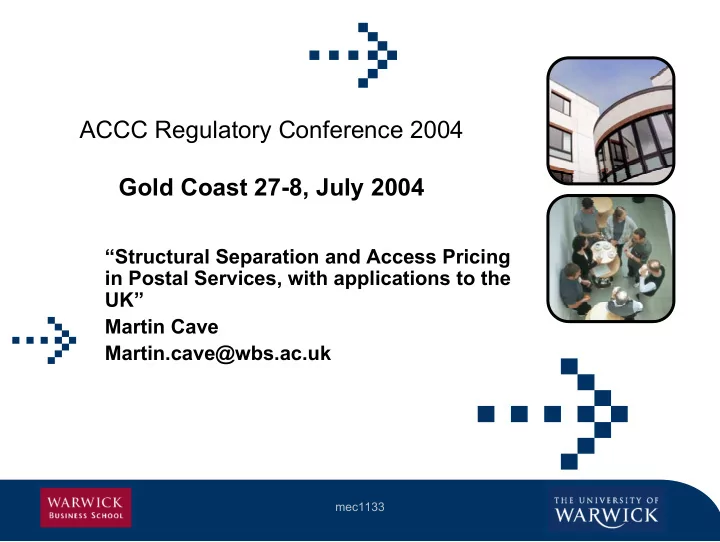

ACCC Regulatory Conference 2004 Gold Coast 27-8, July 2004 “Structural Separation and Access Pricing in Postal Services, with applications to the UK” Martin Cave Martin.cave@wbs.ac.uk mec1133
Part 1: General Discussion Agenda Do competitors want access? No Yes End of story Are there non-replicable assets? Yes Separation desirable? Yes No No Set access What form? Set Set access prices access prices prices mec1133 mec1133 2 2
Mandating Access Cost breakdown: % Collection 5 Outward sorting 12 Transport 14 Inward sorting 14 Delivery 43 Probably largest economies of scale Support 12 100% mec1133 mec1133 3 3
Tests for mandating access to delivery network Competition law/essential facilities Costs not sunk Bronner test not passed? Regulatory approach Current structure distorted by historic and current reservations Impact of USO on delivery costs Promotion of competition via (possibly time-limited) access to encourage infrastructure build-out Assume access is mandated mec1133 mec1133 4 4
Vertical separation and integration Simple results – no regulation Static Both stages competitive –no reason to intervene Both stages monopolies – separation leads to double marginalisation One stage persistent monopoly, the other competitive – structure chosen to minimise costs Dynamic Monopolist may seek to gain market power in ‘competitive’ activity to protect monopoly. mec1133 mec1133 5 5
Monopoly stage regulated Profits shifted to unregulated activity Possible motive for A price squeeze Quality discrimination/sabotage Greater incentive for sabotage The lower regulation keeps monopoly profits The lower is product differentiation The more efficient is the integrated firm’s ‘competitive’ activity Adjustment needed for retail price control How detectable is sabotage? Possible benefits of separation mec1133 mec1133 6 6
Benefits of vertical integration Better co-ordination Overcomes hold-up problems Internalises externalities Risk sharing mec1133 mec1133 7 7
Addressing the benefits of integration in posts, between delivery and upstream activities. Where is optimal point of separation? Will it move? How complex are the contracts? Co-ordinating operational activities Co-ordinating investment activities Needs preliminary quantification mec1133 mec1133 8 8
Other forms of separation Accounting Non-discrimination condition Exposes origins of profits Helps to expose margin squeeze Does it work? Legal separate legal entities, separate arrangements, separate incentives How real are ‘separated’ incentives? mec1133 mec1133 9 9
Access Pricing How should access prices be set? Main candidates: Incremental cost (plus mark up) Retail minus/ECPR (possibly modified) Ramsey prices (Note retail minus affected by separated structure) mec1133 mec1133 10 1 0
An example Service Incremental cost Price Collection and inward sorting 6 Trunking 7 Outward sorting and delivery 15 Retail 2 Total incremental cost 30 30 Common costs 6 - Contribution - 10 Total cost/price 36 40 Incremental cost (plus mark up) = 18 Retail minus (unmodified) = 25 mec1133 mec1133 11 1 1
Access Pricing Objectives IC R- Ramsey ✓ X Promotion of competition X ✓ Efficient retail prices X ✓ Cross-subsidised retail prices ✓ Cost-minimisation s ✓ X Avoidance of inefficient bypas table reflects difficulty in using one instrument to achieve multiple objectives mec1133 mec1133 12 1 2
What are the retail pricing objectives in postal services? Product to product cross-subsidies – probably not Universal service/postalised prices- yes How costly are these? On net avoided cost basis (before benefit) 1-5% of relevant revenues Can the pricing objective be achieved, consistently with efficient input prices? Via output tax/universal service fund mec1133 mec1133 13 1 3
Tentative conclusions Mandate Access? Justified in short/medium term Separation? Investigate further Accounting separation of delivery simple fast step Access pricing? Incremental cost with USO fund dominates alternative pricing rules mec1133 mec1133 14 1 4
Part 2: UK Postal Environment Independent regulator since 2000- Postal Services Commission – Postcomm Market opening - 30% of market (customers with 4000 identical items) opened up on 1 January 2003 - Second stage 1 April 2005 (further 30%) - Process to be complete by 1 April 2007 - UK goes further than required by EU Postal Directive (liberalisation based on weight) - By 2007, markets to be liberalised in Finland, Germany, Netherlands, Norway, Sweden and UK. mec1133 mec1133 15 1 5
Performance of Royal Mail Financial crisis in 2002 Recovery under new management Serious attack on cost base Failure to meet quality targets (all 15 of them in 2003/4) mec1133 mec1133 16 1 6
Markets and market shares Growth of 2-3% p.a. over 10 years £6 billion turnover in regulated market Customers generally unaware of liberalisation process Royal Mail’s market share still >99% mec1133 mec1133 17 1 7
Regulation Price control via price cap from 2003-2006 (RPI + 3 in first year, then RPI-1) Maintaining Universal Service first duty of regulator RM Licence contains provisions for access pricing RM seeking to move to size based pricing (from weight based pricing) RM (unlike competitors) exempt from VAT. mec1133 mec1133 18 1 8
Separation Little discussion in UK No evidence of any trend towards anti- competitiveconduct in provision of access to delivery network Obvious difficulties in choosing where to separate – e.g. same equipment used for inward and outward sorting. Can expect greater use of accounting separation/ ring fencing mec1133 mec1133 19 1 9
Access Pricing Dispute between RM and PostComm over pricing principle (R- vs. IC) Agreement reached between RM and 3 postal operators at rate close to IC for ‘nationwide’ portfolio of delivery PostComm can introduce a price control on access Debate about whether access prices should be geographically de-averaged. mec1133 mec1133 20 2 0
Overview Painfully slow development of competition. Rigorous retail price control can injure competitors – need to cater for their needs. Access in its infancy – needs more transparency. Desirable to have Universal Service Fund in place. mec1133 mec1133 21 2 1
Recommend
More recommend